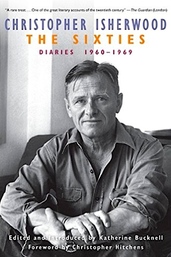A WRITER'S WIT |
I'VE MADE IT MY GOAL to read the entire oeuvre of late British-American author, Christopher Isherwood, over a twelve-month period. This profile constitutes the sixteenth in a series of twenty-four.
My Book World

As I said with regard to the letters exchanged between Elizabeth Bishop and Robert Lowell in their Words in Air, a writer’s diaries, likewise, allow the reader to be a voyeur in a manner that is socially acceptable. I probably enjoyed this volume even more than Isherwood’s first one because here he’s writing between his mid-fifties and mid-sixties. His writing ethic is almost as good as it is in his earlier tome, but because of certain physical ailments (real and imagined, he admits), he gets sidetracked. And also he loses entire days to the previous evening’s drunkenness: he simply doesn’t feel like writing with a hangover. He doesn’t like to socialize as much as he has in the past, and yet he must because he also writes for the film industry and must hobnob with those people. Ah, the pain.
He has formed a loving relationship, though stormy at times, with a man thirty years his junior, artist Don Bachardy. He must, at times, also be a patient father figure, and willing brother, bold example to Don. When Bachardy is out of town, Isherwood mourns their loss of time together. He often doesn’t work or doesn’t get as much done. He must draw on this mournful situation when he pens A Single Man, to understand the pathos of a man who has lost his lover to death. And yet Isherwood also forms lifelong friendships with a wide range of people in the arts and religion: Vera and Igor Stravinsky, Laura and Aldous Huxley, Gore Vidal, Truman Capote, Tennessee Williams, as well as many writers, directors, and producers in theatre and cinema. These are people who nourish the artistic and personal aspects of his life.
As I did with Volume One, I’m now reading the works of fiction and nonfiction that he composes during this decade: A Single Man, Down There on a Visit, A Meeting by the River, and others. My third reading of A Single Man will now be different, colored by knowing the agony of how he approaches it, how he weathers the mixed critical reviews he receives for what he thinks is his very best book. Below I’ve listed a variety of citations typical of his journal writing. Now onto the 1970s and 1980s!
Nuggets:
“[Don] seems to be having constant attacks of my age-old complaint, spasm of the vagus nerve—at least I hope that’s all it is” (24). [health]
“On the 29th, I finished revising ‘Waldemar’ and sent it off right away to Edward [Upward]. It isn’t perfectly all right yet, but it’s as good as I can get it until I have the whole book and can go through it relating all the parts to each other” (30). [writing]
“Well, I can’t help that. It [Down There on a Visit] certainly has its faults. Parts of it—particularly ‘Paul’—are still sloppily written and I must tighten them up before they go to press. But I feel confident that the whole thing does add up to something, and that it has an authenticity of direct experience and is altogether superior to the slickness and know-how and inner falsity of World in the Evening. If people don’t like it, I am sincerely sorry; but already I feel in my bones that I shall never repudiate it or have to apologize for it. So we’ll see” (66). [writing]
“Then Chester Kallman will be coming and we finally approach the talks about the Berlin musical [Cabaret]. I have a feeling these will end badly. Especially as I don’t really like Chester, and as I feel the terms they are proposing are not fair to me: they want us to split three ways, while I feel that I should have something extra as the original author” (72). [writing]
“A story told me by Michael Barrie: Jesus and the Blessed Virgin go out to play golf. The Blessed Virgin is at the top of her form, drives and lands on the green. Jesus slices and lands in the bushes. A squirrel picks up the ball and runs off with it. A dog grab the squirrel, which still holds the ball in its mouth. An eagle swoops down, picks up the dog, squirrel and ball, and soars into the air. Out of a clear sky, lightning strikes the eagle, which drops the dog which drops the squirrel which drops the ball, right into the hole. The Blessed Virgin throws down her driver and exclaims indignantly, ‘Look, are you going to play golf or just fuck around?’” [joke]
“ . . . and a description of how the ‘reassuring’ type of writer takes you by the hand and leads you step by step from a familiar into an unfamiliar situation. (Cf. Hemingway, leading you into a game hunt or a battle; and, if he’s in a place you don’t know, he tries to persuade you that you do know it—‘You know how it there early in the morning in Havana, etc.)’” (181). [writing]
“Sure, I am prejudiced, but I feel always more strongly how ignoble marriage usually is. How it drags down and shackles and degrades a young man like Henri, who is really sweet and bright and full of quiet but powerful passion. The squalid little shop, the little business premises, you have to open, and the deadly social pattern which is then imposed on you—of dragging some dowdy little frump of a woman all around with you, wherever you go, for the next forty years. Not to mention the kids. It is a miserable compromise for the man, and he is apt to punish the woman for having blackmailed him into it” (188). [marriage]
Have just finished Mrs. Dalloway. It is a marvellous book[.] Woolf’s use of the reverie is quite different from Joyce’s stream of consciousness. Beside her, Joyce seems tricky and vulgar and cheap, as she herself thought. Woolf’s kind of reverie is less ‘realistic’ but far more convincing and moving. It can convey tremendous and varied emotion. Joyce’s emotional range is very small” (219). [literature]
“Yesterday I reread my novel, the fifty-six pages I’ve written so far. I am discouraged; very little seems to be emerging. Maybe I really have to sit down and plot a bit before I go on. I do not have a plot and I don’t even know what I want to write a novel about . . . . No, that’s not quite true. I want to write about middle age, and being an alien. And about the Young. And about this woman. The trouble is, I really cannot write entirely by ear; I must do some thinking” (221). [preliminary discussion of his writing of A Single Man, which originally features a woman]
“Since it was no good my sitting with Charles, I had time on my hands and so I drove up to the Griffith Park Observatory to watch the sun set. Astonishing, how empty and wild the hills still seem. As I stood there I felt, as I have felt so often, why don’t I spend more time in awareness, instead of stewing in this daze? How precious these last years ought to be to me, and how I ought to spend them alone—alone inside myself, no matter who is around” (238). [philosophy]
“The Stravinskys came to supper on Monday evening, along with the Huxleys. Bob Craft told us that Igor and Vera were quite transformed while in Russia. They were so happy to be speaking the language in which they were really fluent. All their pride in Russia emerged—especially, of course, Igor’s. Igor, like Picasso, is still really a tolerated exception in the arts; the authorities still don’t approve of what either of them stands for. Igor was chiefly pursued by young people, to whom he is an avant-garde champion. But more of all this, I hope, tomorrow night, when we have supper with them, at their house” (250) [friendship]
“David Roth has a friend who, when he was being examined by the psychologist at the draft board, was asked, ‘Could you kill a man?’ and answered, ‘Yes, but it would take years’” (389). [humorous anecdote]
“Don and I parted discreetly at the car door. As for Gigi, I politely kissed her goodbye on the cheek. Danny took out ten dollars’ worth of life insurance (which pays off three hundred thousand, I think he said). Danny spread his between his children and Gigi, I guess. So I took out the same amount in favor of Don—just to show Danny that we animals are very bit as valuable as humans” (411). [relationship with Don]
“Well, the Cabaret film is on. We stand to win at least ten thousand dollars, for a treatment; then, if that’s accept, ninety thousand for the screenplay; then, if the picture is made, a bonus of twenty-five thousand if we’re the sole credited authors and of ten thousand if we share the credit!” (556). [finance]
“Don said at breakfast this morning that he is so happy with me and with our life together now. I feel the same way, but it is so important to remember that what is alive and flexible is also subject to change—change is a sign of emotional health. Therefore all statements and facts of this kind are merely to be recorded as one records the weather. Which doesn’t make it any the less marvellous when the feather is fine!” (459). [relationship with Don]
NEXT TIME: My Book World


 RSS Feed
RSS Feed